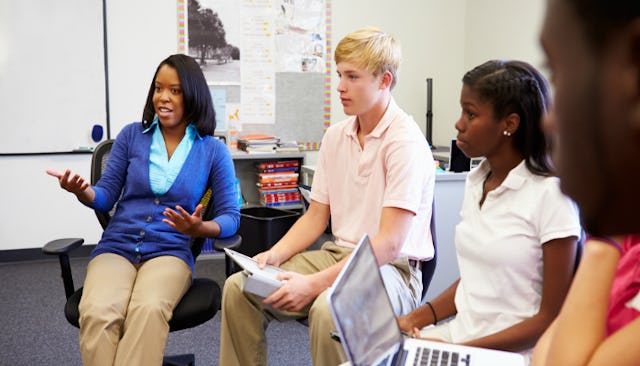A Teacher’s Perspective On Parenting

As an adult, it is difficult for me to remember what I cannot do. If I want a cupcake or ice cream before dinner, no one will limit my desire. If I want to leave my bedroom after lights out, no one will wonder what’s wrong. In many ways, it is freeing to reach the age when all the decisions you make are your own. It is also easy to forget about what it felt like to be a kid living in a world with endless rules and limitations.
I am not a parent—at least not in the traditional sense of having carried and delivered a child. I have, however, acted as one in my role as a middle school English teacher. Many of you just gasped in horror at the idea of willingly entering a room with 30 preteens, and I don’t blame you. I’ve seen enough eye rolls and hair flips to last a lifetime. I’ve also learned a lot about kids that perhaps their own parents don’t know, and I consider my time in front of a classroom expert training for when I do have kids of my own.
1. Kids Are Terrified
If you’ve ever asked a 13-year-old to stand in front of a room full of other 13-year-olds, you know that even the “cool” ones would rather do anything else. It took me a solid year to figure out why no one ever wanted to help me pass out papers, and it’s because they do not want to be the one standing while everyone else is sitting and staring at them.
Life is scary, and it is up to parents and adults to make it seem less so. When kids get home from a day of trying to stifle their real selves, they want to live freely as nothing but what God intended. It is up to us to let them know that they can be who they want to be. Don’t tell them they are being silly. Don’t tell them they need to be more realistic. Let them breathe in the air of their dreams until they fill themselves up with the motivation to make those dreams reality.
2. Kids Want Their Parents to Care
When a kid doesn’t turn in their homework, most act bold and proud in front of their peers. “Look what I did,” they’ll say with a cocky smile. But after, when their friends are gone and it is just them and their teacher, they are remorseful and worried. They will make bargains to be sure that the teacher does not inform their parents that they have failed.
Even if parents don’t know it, their kids are constantly worried and thinking about how they feel about them. “Are they proud of me?” is likely the number-one thought. “Will they forgive me?” is likely another.
The answers should be yes, and yes.
3. Kids Are the Most Creative People on the Planet—Let Them Be
This starts young. At 2-years-old, my nephew told me we were getting into a spacecraft to fly to space. He told me we were going to see the stars. I smiled—what a beautiful thought. It might even have been a thought I would have had for myself before someone told me to keep my head below the clouds.
Embrace your child’s creativity. Ask them where they came up with their latest idea. Tell them their hopes and dreams are beautiful, and no one can limit them from becoming reality but themselves. The fact is, it’s the truth. Somewhere along the way, however, we become conditioned to determine the difference between what is reality and what is fantasy. This is a natural part of growing up, but maybe we can start to leave a little of that creativity intact and sit back and watch what happens.
4. Kids Lie—A Lot
At some point, kids learned that lies can be more bearable than the truth. They learned that life can be complicated and is often made simpler with little white lies. Sometimes, they can lie so much that they become convinced what they are saying is the truth. I’ve seen the frustration on the face of a teenager so unwilling to admit fault that I’ve wondered how we would ever move forward.
Don’t be afraid to call out these lies. Don’t do so with contempt or disgust, just do so with the knowledge that there is a way for you both to understand yourselves better than you did before. There is a reason your child is afraid of the truth, and it gives you an opportunity to help them learn how freeing the truth can be.
5. Kids Need Help
Life is a mystery, and we are all just trying to make sense of it. Kids are no exception, and they need even more help than we do to know that everything is going to be alright. They might not know how to ask for that help, or that they even want it, and that’s when being a parent or teacher becomes a challenging job, because you have to figure out when to step in and offer assistance.
Again, I am not a parent. I don’t pretend to know the first thing about sleepless nights spent rocking a crying baby to sleep or waiting for a 16-year-old with a newly minted driver’s license to come home. I don’t know about the struggle to balance work and family and the guilt that can come from feeling like you aren’t doing enough.
I do know, however, that if you work every day to understand your child a little better than you did the day before, if you embrace them and love them for who they are, and if you forgive them when they undoubtedly make the mistakes you may have made at their age, you are doing the very best you can.